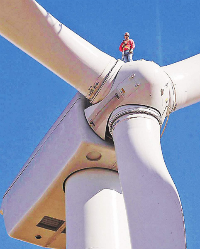Is Renewable Energy a Threat To Economic Prosperity?
I’m proud that Tom Konrad, famed stock market analyst and editor of AltEnergyStocks.com, offers his comments here frequently. In a post yesterday, he offered me guidance in wrapping my wits around the issue of green jobs, directing me to his thoughtful article on Forbes.com, linked below. There, Tom looks at the issue from the standpoint of basic microeconomics’ “production function” which suggests that labor can be freely substituted for capital and energy. He provides examples recently, including this one:
Shifting people out of their cars and onto mass transit will create jobs because there will have to be drivers and people managing the transit system, where before no one was paid to drive. To the extent that the transit system can be paid for out of the reduced fuel costs and car ownership costs of the former drivers turned riders, the number of jobs created will be a pure economic gain.
But I wonder if it’s that simple. Even in this apparently straightforward example, doesn’t one have to ask about all the people associated with the shrinking auto industry? Moving individuals out of their cars and onto buses also affects everyone associated with the petroleum industry and the entire auto aftermarket: tires, smog checks, brake jobs, etc.
Having said this, from everything I’ve read on the subject, I’m convinced that “going green” represents a huge net gain in jobs, at least in the short-term. I can’t imagine how anyone can argue that the process of retrofitting our buildings for energy efficiency will not employ many times more people than will be lost in producing the electricity that is currently being wasted; principally these are people working in coal and natural gas.
It’s equally hard to argue that installing PV, solar thermal, wind, geothermal, hydro, and biomass facilities won’t employ more people than will be lost from the ranks of the traditional sources of energy – at least for a period of time. But that’s where it gets complicated, and I’m not sure anyone has the answer. What happens when all this stuff is installed and operational? Sure, there’s maintenance, but it’s minimal, since the fuel is free – and most of it’s coming at us non-stop from a hot yellow ball in the sky 93 million miles away.
And what about electric transportation? The migration from internal combustion engines to EVs is going to require a ton of people in batteries, smart-grid, telematics (the information and communications technology – “ICT” — connected with all this), not to mention the manufacturing of the EVs themselves. But now you have vehicles that go 500,000 miles before they even need a tune-up. That’s a lot of displaced auto mechanics.
Here’s a conclusion that’s fairly safe: The vast majority of what you read on this subject is horribly slanted. In most of what I’ve come across, figures are presented out of context (or made up out of whole cloth) to support a certain political ideology. The idea, for instance, that environmentalism is at odds with economic prosperity, a concept so dear to right wing demagogues, is totally specious, yet it’s easy to make that point and convince an audience of ignorant and angry people if you present certain numbers and omit others.
But let’s be honest with ourselves: it’s equally disingenuous to suggest that every innovation in clean energy and transportation will add jobs. Renewable energy is about technology, and technology has a tendency to displace human labor. At the end of the day, the real imperative to move to clean energy and transportation is the health and safety of every living thing on Earth. That’s at least somewhat important, isn’t it?


Sure retrofitting buildings to improve energy efficiency will create jobs, but only temporarily. However, the fact that the jobs are only temporary is not a good reason to oppose it. Improving energy efficiency is a desirable goal until the point of diminishing returns is excessively exceeded and that has not yet occurred.
A change in energy policy that would provide more jobs is not necessarily a good thing. Remember that the Industrial Revolution was about reducing the number of people required for manufacturing so that products would cost less thereby enabling more people to buy them. The net result was a very great increase in prosperity and reduction in working hours from 80 or more hour per week to 40 hours per week. A change in energy policy that would require employing too many people and excessive investment would lower our standard of living to a degree that would be politically unacceptable.
Using solar energy to generate electricity is not efficient; it is difficult to achieve an efficiency greater than 20%. On the other hand, using solar energy for heat can exceed an efficiency of 50%. Therefore, it would seem that more effort should be made to encourage solar heating of buildings instead of putting PV panels on them. Solar cooling using the lithium bromide / water absorption system could be practical.
Also, more effort should go into city planning to reduce commuting distances and make public transportation more convenient, practical, and efficient. Electric cars can be used for moderate distances and will reduce pollution and global warming depending partly on how the power is generated to recharge them.
I continue to believe that for generating electricity, solar and wind power will never be practical to generate a significant percentage of the power required for large prosperous countries. As sources of energy, they are intermittent, have a high degree of unpredictability, and are very diffuse. The numbers just do not add up.